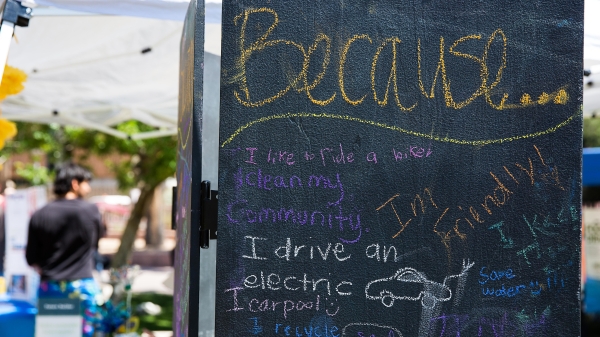Globalization is nothing new, research finds

Photo by Deanna Dent/ASU Now
Globalization is discussed often as a relatively new phenomenon, arising sometime after the spread of the internet. But new research from Utah State University and Arizona State University published in the Proceedings of the National Academy of Sciences shows that the roots of globalization stretch back 10,000 years.
Marty Anderies, a professor of sustainability at ASU and co-author on the paper titled “Synchronization of energy consumption by human societies throughout the Holocene,” spoke with ASU Now about the findings.
Question: How did the idea for this research come about?
Answer: Archaeologists around the world have been working to gather radiocarbon data from very old human trash for quite a long time. Recent efforts to pull together this radiocarbon data analyzed in recent decades have opened up interesting research opportunities, and that’s where our work started.
The availability of this long-term data has allowed us to look at how human societies use energy over time. The question is: Is human energy use synchronized across space and time in any way? That’s a proxy for trying to understand the evolution of human societies, because energy use is a proxy for the size of human societies, and the complexity of human societies.
Q: What did early human energy consumption looked like?
A: In small-scale societies — for example, hunter-gatherer groups — people used natural resources to fuel their societies and economies. If you look at early human societies around the globe, you might expect that they follow natural resource availability driven by solar energy. And as societies developed, they transitioned from solar to fossil fuels.
Q: What were your findings, and what makes those findings significant?
A: The findings are significant because they help us understand general patterns of the evolution of human societies. They help us understand that the globalization we talk about today is nothing new. It has happened in the past. The main finding is that if you look at energy consumption in societies, in different places around the world, their correlation decreases with distance. This suggests that societies’ energy consumption may be linked by trade networks — networks of exchange, migration and conflict. So, energy consumption within societies is more correlated by processes within those societies rather than an outside driver, the availability of solar energy, for example.
In modern times, we’re facing this issue of human societies becoming highly correlated around the world due to exactly these processes: economic exchange and migration. The entire globe is now linked, and that is a modern consequence of modern technology. Globalization has been going on for a very long time, and will continue. The scale of globalization is the only thing that is new today.
More Environment and sustainability

Earth Day celebrations focus on making our planet a priority
On April 22, Earth Day is celebrated across the country and in nearly 193 countries around the world. Arizona State University…

ASU scientist studies how bans, regulations on food technology affect consumer acceptance, perceptions
How do people process scientific developments with outside influences, warnings, biases and others’ opinions filtering in? That…

ASU team's research leads to new law protecting mobile-home dwellers
Arizona Gov. Katie Hobbs signed a law earlier this month that guarantees mobile-home owners’ right to install cooling measures,…